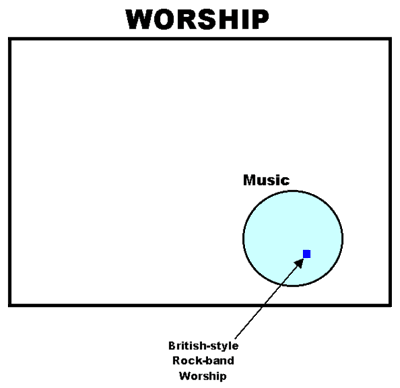It is curious to look at what professional lexicographers have to say about worship, without necessarily attaching things to their own tradition.
From the Random House Unabridged Dictionary (2006) via Dictionary.com:
noun
1. reverent honor and homage paid to God or a sacred personage, or to any object regarded as sacred.
2. formal or ceremonious rendering of such honor and homage: They attended worship this morning.
3. adoring reverence or regard: excessive worship of business success.
4. the object of adoring reverence or regard.
verb
6. to render religious reverence and homage to.
7. to feel an adoring reverence or regard for (any person or thing).
I think it is interesting here is #7. Feelings of adoration, but not necessarily tied to action. The others deal more with the external object. You revere God and SO you do something like proclaim it or participate in a formal ceremony honoring him. So, are you really worshipping if there is not visible outward action? If I love coffee, but never drink any, do I still love it? Well, I think the answer is yes. However, when you try to apply this same idea to religious works, things can get a bit sticky. If you love Jesus, but don’t turn from your sin and call him Lord, do you really love him? Our salvation is by grace alone, (HIS work), but it also implies action on our part (repentance). Theologians can bat this around the park all day. I think I’ll go get a hot dog.

Back to worship. How much is our worship to the Lord an outside action – something physical and tangible like the song we are singing, the candle we are burning, the the sacrifice on the altar, the bending of our knees? How much of it is what goes on inside us – our hearts loving, our emotions captured, our minds meditating on? One could say that they are just two components of worship: the internal and external. That’s pretty straight forward. Or you could say that what goes on inside is the source and it overflows as action with our bodies. So if you sing a worship song, but don’t “mean it” inside, is it really worship? I think most people would say no. (I say no too.) So if you don’t give a rip about Jesus, but go through the motions of a worship service, does this please God? I really doubt it. What if you feel love for God on the outside, but you never do anything (formal or informal) to render praise in a way that another human being would recognize? Probably not worship either. You could say, “Well, that is pointless, since if it was really in the heart, then it MUST come out somehow. Even if just a little bit. So there is not worship that is JUST inside.” I think I’ll say that too.
I would just like to add, that we should be careful to judge how worshipful someone is by looking on the outside. That’s what WE see, but the Lord looks at the heart. Someone may seem on the outside to not be worshipping very much or in a very potent way, maybe just kneeling in prayer. Another may be making quite an elaborate show, maybe singing and dancing and shouting or leading an elaborate ceremony with candles, robes, incense, and sophisticated music. Both may be worshiping with lots of energy and God may be pleased to receive it. But the Lord looks at the heart.

I like how the American Heritage dictionary brings “love” into the mix:
1. The reverent love and devotion accorded a deity, an idol, or a sacred object.
2. The ceremonies, prayers, or other religious forms by which this love is expressed.
So here, it is first the source, or feeling and then number 2 is the outward action. I think this definition is a lot more useful than the first one I looked at.
The Princeton dictionary (via WordNet) has a distinctly non-Christian feel to it:
noun
1. the activity of worshipping
2. a feeling of profound love and admirationverb
1. love unquestioningly and uncritically or to excess; venerate as an idol; “Many teenagers idolized the Beatles” [syn: idolize]
2. show devotion to (a deity); “Many Hindus worship Shiva”
3. attend religious services; “They worship in the traditional manner”
Why is this a non-Christian definition? It’s not just that Shiva is given as an example. Whatever. Look a little closer. The activity comes first. The metaphysical is given as secondary. Notice how in the verb it is simply “attending” worship services. All you have to do is show up. Finally, the first example of the verb given implies that when worshipping, you don’t question what you are doing, have not thought critically about it, and are doing it in excess. So a rock-band doesn’t deserve this kind of devotion, but I believe the author of this entry doesn’t think any god deserves it either.
For the flip side, let’s take a look at the classic Webster’s 1828:

noun
4. Chiefly and eminently, the act of paying divine honors to the Supreme Being; or the reverence and homage paid to him in religious exercises, consisting in adoration, confession, prayer, thanksgiving and the like.
(The worship of God is an eminent part of religion. Prayer is a chief part of religious worship.)
5. The homage paid to idols or false gods by pagans; as the worship or Isis.
6. Honor; respect; civil deference.
(Then shalt thou have worship in the presence of them that sit at meat with thee. Luke 14.)
7. Idolatry of lovers; obsequious or submissive respect.verb
1. To adore; to pay divine honors to; to reverence with supreme respect and veneration. (Thou shalt worship no other God. Exodus 34.)
2. To respect; to honor; to treat with civil reverence.
3. To honor with extravagant love and extreme submission; as a lover.
Webster spends the first three sections (not shown) on the archaic definitions that we don’t use anymore (meaning worthiness, or the title of a certain British magistrate). Then he jumps into the actions, even giving specific examples. He ties outside worship to being a key component of religion. He also contrasts it with worship paid to things that don’t deserve it (idols and human lovers). In the verb though, I don’t think he is qualifying the love component. The love can be towards God too, but he would have thought “reverence” was a better word for what we feel toward Jesus. I like this one a lot!
I’m sure this could be explored a little more, but that’s all I have time for today.






